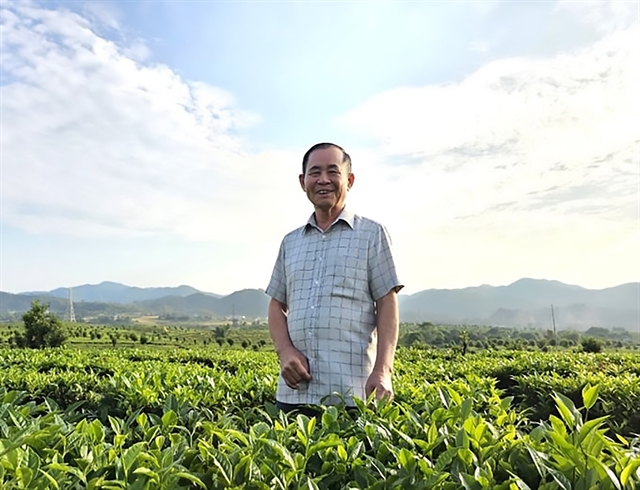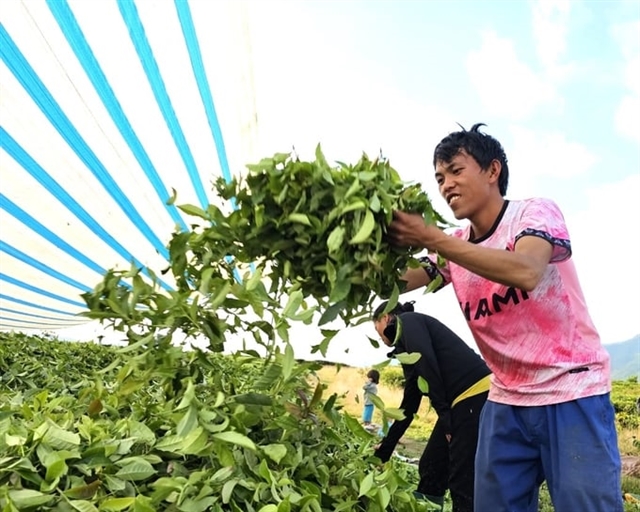 Society
Society


|
| Vũ Ngọc Sang, the board chair and director of Than Uyên Tea JSC, has taken decisive steps to transform tea production in the region. — Photo nongnghiep.vn |
LAI CHÂU — Vũ Ngọc Sang, a tea entrepreneur in the Than Uyên tea growing zone, has revolutionised farming practices and built a brand for tea products from the area.
Considered the tea capital of the northern Lai Châu Province, Than Uyên tea fields span more than 3,400ha, some 500ha of which is under the management of Sang’s Than Uyên Tea JSC.
The company also collaborates with local households on more than 700ha.
After his business began the equitisation process in 2014, Sang has taken decisive steps to transform tea production in Than Uyên.
He observed that there was excessive use of fertilisers and chemical pesticides among local tea farmers over a long period of time.
“Season after season, year after year, this farming practice had become the norm, and therefore it was difficult to persuade farmers to change, despite the severe consequences they faced,” said Sang.
This practice led to land degradation and reduced productivity and fertility; several batches of exports were returned as they failed to meet the export market standards.
Despite the vast land of ingredients and prospective partners and investors, Than Uyên tea products were lagging behind compared to other renowned tea regions such as Tân Cương (Thái Nguyên Province) and Suối Giàng (Yên Bái Province).
These are also other obstacles facing local tea growers, and many people have quit tea growing to switch to other professions, Sang said.
When the equitisation process was completed in 2017, Sang decided to prioritise eradicating farming practices with chemical fertilisers in the tea growing areas under his company’s management.
The business also recommended microbial fertilisers to its partner households, as healthy soil is vital to the improvement of tea production.
To “detox” the tea growing land, Than Uyên Tea JSC also collaborated with a fertiliser supplier to customise a variety of organic fertilisers.
Each year, the supplier will send its expert to Than Uyên to collect soil samples and analyse its composition and nutrient content to produce suitable fertilising products.
Chemical pesticides were also gradually phased out and replaced by regulated and herb-based plant protection substances, with guidance from the team of technicians of Sang’s tea company.
To persuade locals to stop using toxic chemical fertilisers and pesticides, Than Uyên Tea committed to households producing tea following organic and VietGAP standards that their produce would be bought at a higher price than that of the market, in addition to providing farming material support and guidance from the company’s technical staff.
As these measures were applied, local tea growers gradually saw the positive effects and followed the stringent requirements from the company.

|
| Harvesting tea in Than Uyên tea growing zone. — Photo nongnghiep.vn |
Today, the entire 500ha-area of Than Uyên Tea JSC meets VietGAP requirements, with some striving for organic standards.
Soil quality is also improving in the 700ha tea growing area where the company partnered with 600 local households in Mường Khoa, Trung Đồng and Thân Thuộc communes, and Tân Uyên District.
Thào A Ching, a tea farmer in Tân Uyên District said: “In the past, due to the excessive use of nitrogen fertilisers and plant protection chemicals, Than Uyên tea often had a bitter taste.
“Fresh tea buds were difficult to preserve and easily went rancid in hot, humid weather. They also did not have the characteristic aroma of shan tuyết tea grown in the high mountains.
“By switching to a safer cultivation process, tea plants are now free from pests and diseases, while their composition also changed for a more delicious and aromatic product,” he added.
Each year, Than Uyên Tea company produces more than 2,000 tons of tea products from this area, many of which are exported to China, Taiwan, Japan, the US, Europe or the Middle East, bringing in annual revenue of more than VNĐ100 billion (US$4.1 million).
The company is also building another tea processing factory in the area to ensure production and outputs for local farmers, while making use of automation to boost productivity.
Sang, the company’s board chair and director said: “With favourable natural conditions, tea growing is the key sector and the livelihood of ethnic communities in Tân Uyên.
“Therefore, our aspiration is for people to have a stable income and even prosper from tea.”
In addition to tea production, Than Uyên Tea company also takes bold steps to convert old tea areas into fruit orchards such as jackfruit, sapodilla, pineapple or avocado.
When this model is proven successful, the company will proceed with technology transfer and building processing factories to ensure better lives for the local people, Sang said. — VNS




